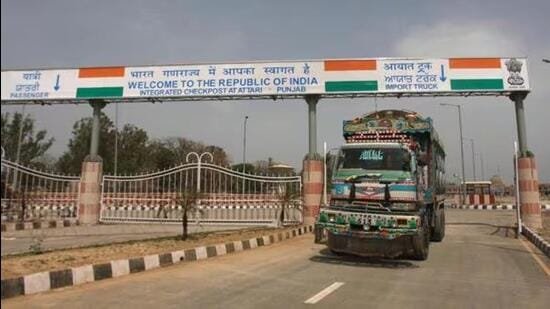Attari, May 16: In a sign of easing tensions following the May 10 ceasefire between India and Pakistan, eight Afghan trucks loaded with dry fruits entered India through the Attari Integrated Check Post (ICP) on Friday—offering much-needed relief to traders on both sides of the border.
These trucks were among approximately 150 vehicles stranded between Lahore and the Wagah border since April 24, when Pakistan suspended trade with India, including third-country transit, in response to India’s curbs following the April 22 Pahalgam terror attack that killed 26 people, mostly tourists.
“Eight trucks have come to the Indian side. Others are expected to follow soon,” said B.K. Bajaj, president of the Indo-Foreign Chamber of Commerce. “We thank the Governments of India, Pakistan, and Afghanistan for making this possible.”
According to official sources, the trucks crossed into Indian territory Friday afternoon via the Attari-Wagah border, the only permitted land trade route between India and Pakistan.
The partial reopening came after a formal request from the Afghan embassy in Islamabad. Pakistan subsequently allowed the 150 Afghan trucks that had entered its territory before April 25 to proceed to India.
With the corridor blocked for nearly three weeks, traders faced mounting losses as perishable goods began to deteriorate. “We make advance payments to Afghan suppliers. Had the route remained shut, the losses would have been severe,” said Mukesh Sidhwani, an Amritsar-based dry fruit importer.
Porters working at the Attari checkpost also welcomed the move. “Our livelihood depends on cross-border trade. We were staring at a bleak future,” said Gursahib Singh, a porter stationed at the ICP.
Afghan traders had repeatedly warned that continued closure of the Attari-Wagah corridor would lead to spoilage of goods. The route remains one of the fastest and most economical paths for trade between India and Afghanistan.
India-Pakistan trade ties have remained strained since the Pulwama terror attack in February 2019, which killed 44 CRPF personnel. In response, India sharply increased customs duties on Pakistani imports from 5% to 200%, reducing imports to a trickle. The final blow came in August 2019, when Pakistan severed trade relations after India revoked Article 370, ending Jammu and Kashmir’s special constitutional status.
Although Pakistan blocked Indian exports to Afghanistan, it continued to allow Afghan imports into India—even after the Taliban takeover. Before the Pahalgam attack, around 40 to 45 Afghan trucks crossed into India daily.
Friday’s development offers a limited but hopeful sign of cooperation amid a volatile diplomatic landscape.

